Module4导学案
Module4 unit3 导学案
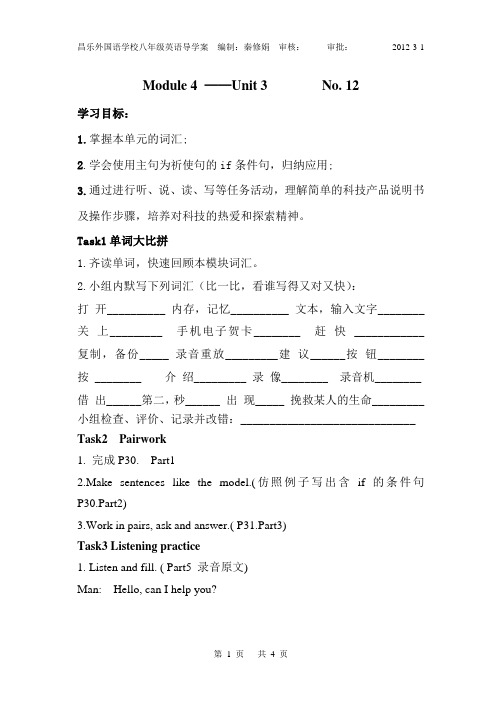
Module 4 ——Unit 3 No. 12学习目标:1.掌握本单元的词汇;2.学会使用主句为祈使句的if条件句,归纳应用;3.通过进行听、说、读、写等任务活动,理解简单的科技产品说明书及操作步骤,培养对科技的热爱和探索精神。
Task1单词大比拼1.齐读单词,快速回顾本模块词汇。
2.小组内默写下列词汇(比一比,看谁写得又对又快):打开__________ 内存,记忆__________ 文本,输入文字________关上_________ 手机电子贺卡________ 赶快____________复制,备份_____ 录音重放_________建议______按钮________按 ________ 介绍_________ 录像________ 录音机________借出______第二,秒______ 出现_____ 挽救某人的生命_________ 小组检查、评价、记录并改错:______________________________Task2 Pairwork1. 完成P30. Part12.Make sentences like the model.(仿照例子写出含if的条件句P30.Part2)3.Work in pairs, ask and answer.( P31.Part3)Task3 Listening practice1. Listen and fill. ( Part5 录音原文)Man: Hello, can I help you?Woman: Yes, please. I want to buy a ______ phone, but I don’t know which one to get. How can I choose the best phone?Man: First, you need to decide what you want it for.Woman: That’s easy!I want to call my friends, and I don’t want to look for a _______ telephone.Man: If you only want to make telephone calls, you only need a simple phone.Woman: Oh, well, I want to send ______ messages, too. I love sending text messages.Man: That’s not a problem. All mobile phones can send text messages. Woman: Why are some phones more expensive than others?Man: Well, that’s because you use them to take ________, too. Woman: That sounds ________.Man: And you can ______ music on some phones.Woman: Wow! That’s the phone I want.Man: Well, have a look at this one…2. Listen and check the true sentences. ( P31.Part5)Task4 Reading practice.1. Read the passage and fill in the blanks.(读一读,填一填,完成课本P31.Part4).2. Read the ad, answer the questions.(读一读,完成part6问题)3. 语言点学习:1)再读材料,找出下列短语:打开播放机__________ 按绿按钮__________将播放机和你的电脑连接____________________在电脑上保存录音___________________________接收贺卡__________ 在度假_________ 拍照__________背面的信息_____________ 编辑文本信息______________2)Part 6中有一个if 条件句,请找出来,并译成现代汉语。
Module 4导学案
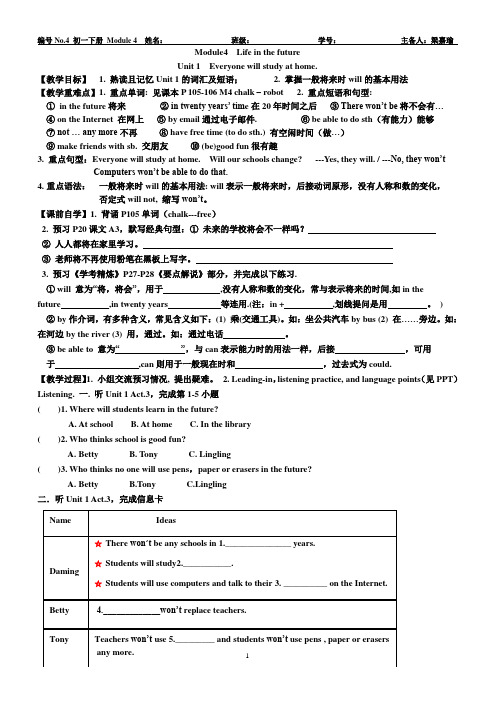
Module4 Life in the futureUnit 1 Everyone will study at home.【教学目标】 1. 熟读且记忆Unit 1的词汇及短语; 2. 掌握一般将来时will的基本用法【教学重难点】1. 重点单词: 见课本P 105-106 M4 chalk – robot 2. 重点短语和句型:①in the future将来② in twenty years’ tim e在20年时间之后③ There won’t be将不会有…④ on the Internet 在网上⑤ by email通过电子邮件. ⑥ be able to do sth(有能力)能够⑦ not … any more不再⑧ have free time (to do sth.) 有空闲时间(做…)⑨ make friends with sb. 交朋友⑩ (be)good fun很有趣3. 重点句型:Everyone will study at home. Will our schools change? ---Yes, they will. / ---No, they won’tComputers won’t be able to do that.4.重点语法:一般将来时will的基本用法: will表示一般将来时,后接动词原形,没有人称和数的变化,否定式will not, 缩写won’t。
【课前自学】1. 背诵P105单词(chalk---free)2. 预习P20课文A3,默写经典句型:①未来的学校将会不一样吗?②人人都将在家里学习。
③老师将不再使用粉笔在黑板上写字。
3. 预习《学考精炼》P27-P28《要点解说》部分,并完成以下练习.① will 意为“将,将会”,用于,没有人称和数的变化,常与表示将来的时间,如in thefuture ,in twenty years 等连用.(注:in + ,划线提问是用。
外研版必修四module 4 单元导学案

Module 4 Great ScientistsI.教学内容分析本模块以Great Scientists 为话题,介绍了几位不同的科学家,并对我国著名的科学家袁隆平作了主要介绍。
旨在通过本模块的教学,使学生能够运用所学词汇和句型来描述科学家及他们的的发明。
Introduction 部分介绍了几位不同的科学家和学科名称,使学生进一步熟悉词汇、句型,为本模块的学习奠定基础。
Reading and V ocabulary 部分通过阅读The Student who Asked Questions,让学生学习相关词汇,学会归纳文章的主旨大意;分析文章的结构和写作技巧;并进一步了解我国著名科学家袁隆平和他的杂交水稻,对学生进行思想教育。
Grammar 1部分以练习的形式来复习一般现在时、一般过去时,一般将来时和现在完成的被动语态。
Grammar 2部分通过让学生了解介词by +v.- ing 这种形式并能用其改写句子。
Function 部分学习数字的读法,并能进一步去读位数较多的数字,分数和百分数。
Listening and vocabulary 部分听取一段关于科学家爱因斯坦和霍金及他们发明的录音内容,培养学生获取主要信息的能力。
Reading and Writing部分使学生了解有关霍金的信息,学会写如何介绍生平的文章,并能运用所给信息写一篇介绍爱因斯坦的文章。
Pronunciation部分通过听力训练,让学生掌握多音节单词的重音的读法。
Speaking部分要求学生运用所学知识,做猜科学家名字的游戏。
Everyday English部分通过对听力材料的阅读,使学生能在情景中学会材料中出现的日常交际用语的运用。
Cultural Corner部分是一篇介绍火箭的历史和发展的文章,让学生通过阅读了解当今社会科技发展的主要方向和重大成果。
Task部分是对本模块的一个复习与应用,要求学生小组活动,制作一个广播节目来介绍一位科学家的生平。
Module 4导学案
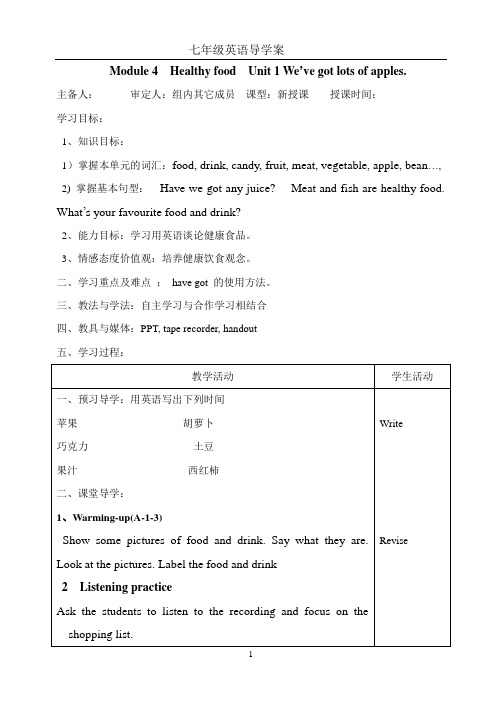
Module 4 Healthy food Unit 1 We’ve got lots of apples.主备人:审定人:组内其它成员课型:新授课授课时间:学习目标:1、知识目标:1)掌握本单元的词汇:food, drink, candy, fruit, meat, vegetable, apple, bean…, 2) 掌握基本句型:Have we got any juice?Meat and fish are healthy food. What’s your favourite food and drink?2、能力目标:学习用英语谈论健康食品。
3、情感态度价值观:培养健康饮食观念。
二、学习重点及难点:have got 的使用方法。
三、教法与学法:自主学习与合作学习相结合四、教具与媒体:PPT, tape recorder, handout五、学习过程:Unit 1 We’ve got lots of apples.主备人:审定人:组内其它成员课型:新授课授课时间:1、知识目标:1)掌握本单元的词汇:food, drink, candy, fruit, meat, vegetable, apple, bean…, 2) 掌握基本句型:Have we got any juice?Meat and fish are healthy food. What’s your favourite food and drink?2、能力目标:学习用英语谈论健康食品。
3、情感态度价值观:培养学生健康饮食观念。
二、学习重点及难点:have got 的使用方法。
三、教法与学法:自主学习与合作学习相结合四、教具与媒体:PPT, tape recorder, handout五、学习过程:Unit 2 Is your food and drink healthy?主备人:审定人:组内其它成员课型:新授课授课时间一、学习目标:1.知识目标:Key vocabulary: healthy, delicious, bread, fish, hamburger, ice cream…Key phrase: be good for, be bad for, a bit,Key structures: … and …are healthy food but … and … are my favourite food. 2.能力目标: have got 的用法。
新外研版八年级英语下册导学案-Module 4-Seeing the doctor(U1-U3)
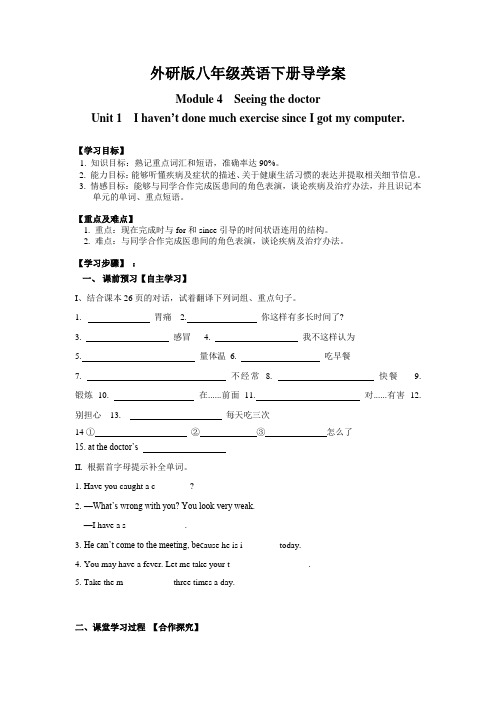
外研版八年级英语下册导学案Module 4 Seeing the doctorUnit 1 I haven’t done much exercise since I got my computer.【学习目标】1. 知识目标:熟记重点词汇和短语,准确率达90%。
2. 能力目标:能够听懂疾病及症状的描述、关于健康生活习惯的表达并提取相关细节信息。
3. 情感目标:能够与同学合作完成医患间的角色表演,谈论疾病及治疗办法,并且识记本单元的单词、重点短语。
【重点及难点】1. 重点:现在完成时与for和since引导的时间状语连用的结构。
2. 难点:与同学合作完成医患间的角色表演,谈论疾病及治疗办法。
【学习步骤】:一、课前预习【自主学习】I、结合课本26页的对话,试着翻译下列词组、重点句子。
1.胃痛2. 你这样有多长时间了?3. 感冒4. 我不这样认为5. 量体温6. 吃早餐7. 不经常8. 快餐9. 锻炼10. 在......前面11. 对......有害12. 别担心13. 每天吃三次14 ①②③怎么了15. at the doctor’sII. 根据首字母提示补全单词。
1. Have you caught a c________?2.—What’s wrong with you? You look very weak.—I have a s_____________ .3.He can’t come to the meeting, bec ause he is i________ today.4.You may have a fever. Let me take your t__________________.5. Take the m___________ three times a day.二、课堂学习过程【合作探究】Step1 Match the words in the box with the pictures.cough fever headachestomach ache toothacheStep2 Listen and check (√) what’s wrong with Betty and Daming.Betty Damingcoughfeverheadachestomach achetoothacheStep3. Complete the passage with the words in the box.cough fever health stomachache temperatureIt is easy to look after your (1) _______. Just do some exercise, such as running. Do not eat fast food! It may give you a (2) ___________. Most illnesses are not dangerous but when you catch a cold or get a (3) _______, you may also get a (4) _______. This means your (5) ___________ is higher than usual. You must go to the doctor.Step4. Listen and ch eck (√)what’s wrong with Betty and Daming.(Activity 2)Step5. III. Listen and complete the table about Daming.Illness (1) and .How long (2)For about .Why (3)①food and no .②He spendsin front of the .What to do (4)First, stop eating and.Second, get some .Take some a day.Step6. Listen and notice the intonation1. How can I help you?2. How long have been like this?3. Have you caught a cold?4. Do you do any exercise?分析: 英语有两种基本语调:升调和降调。
Module4导学案外研版英语八年级上册

初二英语学业发展历案M4 Planes, ships and trainsU1 He lives the farthest from school.【学习目标】1.在语境中理解并认读下列词汇:road,accident,except,choice, far,far from,all the time.2.通过听和阅读对话,获取细节信息并借助提示简述对话内容;3.通过贝蒂和妈妈讨论上学的出行方式,学生交通安全意识得到增强。
【课前预习】一、词汇及拓展1. n.路;公路________2. n.交通事故;意外事件_______3. prep.除…之外________4. n.选择________ (v.)________(p.t.)_______5. n.同班同学________6. adv. adj.远;遥远的________7. 远离________ 8. adv. adj.近的;接近的(地)________9. adj.拥挤的________(v.)________ 10. 一直;不断地________二、翻译下列短语1. 迟到be late for2.发生了什么What happened?3.最舒服的方式the most comfortable way4.道路事故a road accident5.交通堵塞heavy traffic6.一个好的选择a good choice7.有点危险a bit dangerous8.乘坐地铁take the underground9. 和...一样the same as 10....中的大多数most of11.远离far from 12.那么的拥挤so crowded【课堂活动】I.Lead in: Free Talk Look at the pictures and talk about them. Use the words to help you.II.Listening(一)小听力。
六年级英语下册Module 4导学案(外研社)
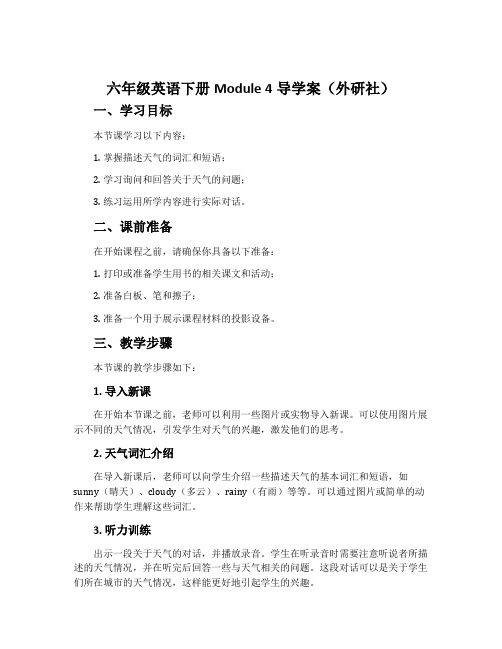
六年级英语下册Module 4导学案(外研社)
一、学习目标
本节课学习以下内容:
1.掌握描述天气的词汇和短语;
2.学习询问和回答关于天气的问题;
3.练习运用所学内容进行实际对话。
二、课前准备
在开始课程之前,请确保你具备以下准备:
1.打印或准备学生用书的相关课文和活动;
2.准备白板、笔和擦子;
3.准备一个用于展示课程材料的投影设备。
三、教学步骤
本节课的教学步骤如下:
1. 导入新课
在开始本节课之前,老师可以利用一些图片或实物导入新课。
可以使用图片展示不同的天气情况,引发学生对天气的兴趣,激发他们的思考。
2. 天气词汇介绍
在导入新课后,老师可以向学生介绍一些描述天气的基本词汇和短语,如sunny(晴天)、cloudy(多云)、rainy(有雨)等等。
可以通过图片或简单的动作来帮助学生理解这些词汇。
3. 听力训练
出示一段关于天气的对话,并播放录音。
学生在听录音时需要注意听说者所描述的天气情况,并在听完后回答一些与天气相关的问题。
这段对话可以是关于学生们所在城市的天气情况,这样能更好地引起学生的兴趣。
4. 对话练习
分成小组,让学生们进行对话练习。
每个小组中的学生可以轮流问对方关于天气的问题,并回答对方提出的问题。
老师可以设定一些问题,如。
外研社高中英语module 4导学案
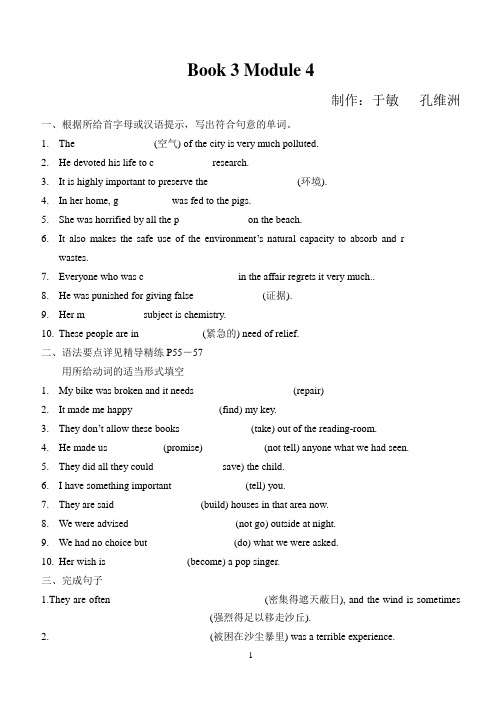
Book 3 Module 4制作:于敏孔维洲一、根据所给首字母或汉语提示,写出符合句意的单词。
1.The _______________(空气) of the city is very much polluted.2.He devoted his life to c___________ research.3.It is highly important to preserve the _________________(环境).4.In her home, g__________ was fed to the pigs.5.She was horrified by all the p_____________ on the beach.6.It also makes the safe use of the environment’s natural capacity to absorb and r___________wastes.7.Everyone who was c__________________ in the affair regrets it very much..8.He was punished for giving false _____________(证据).9.Her m___________ subject is chemistry.10.These people are in ____________(紧急的) need of relief.二、语法要点详见精导精练P55-57用所给动词的适当形式填空1.My bike was broken and it needs ___________________(repair)2.It made me happy ________________ (find) my key.3.They don’t allow these books _____________ (take) out of the reading-room.4.He made us __________ (promise) ___________ (not tell) anyone what we had seen.5.They did all they could _____________save) the child.6.I have something important______________ (tell) you.7.They are said ________________ (build) houses in that area now.8.We were advised ____________________ (not go) outside at night.9.We had no choice but ________________ (do) what we were asked.10.Her wish is _______________ (become) a pop singer.三、完成句子1.They are often _____________________________ (密集得遮天蔽日), and the wind is sometimes______________________________(强烈得足以移走沙丘).2. _______________________________(被困在沙尘暴里) was a terrible experience.3. It was the most _____________________________________(最可怕,最危险的情形) I have ever been in.4.This is a process _____________________________________(土地沙漠化时产生) because of climate changes and because people__________________________ (砍伐森林及破坏草地).5. Citizens __________________________________(醒来发现的是) an orange sky.6.Traffic moves very slowly because_________________________(密集的沙尘使能见度很低).7.The CCWS can ___________________(预报沙尘暴) some weeks before it arrives in Beijing.8.The workers do nothing _______________________________________________(除喝茶聊天外).9.Before __________________(在采访之前), write down the questions _______________ ______________ (你要问的).10.Some countries are better than others____________________________ (在保护环境方面)11.Then the garbage _________________(被运走) and,___________(如果可能的话), recycled.12.There are laws ______________________________________(禁止人们燃烧太多的煤).四、单项选择1. I’ve worked with children before, so I know what ______ in my new job. (2000)A. expectedB. to expectC. to be expectingD. expects2. ________ late in the afternoon, Bob turned off the alarm. (2001BJ)A. To sleepB. SleepingC. SleepD. Having sleep3. She will tell us why she feels so strongly that each of us has a role ______ in making the earth a better place to live. (2003SH)A. to have playedB. to playC. to be playedD. to be playing4. The pickpocket was observed ____ the man’s wallet.A. takeB. takenC. tookD. to take5. He is said ______ abroad.A. to have been sentB. to have sentC. have been sentD. have sent6. The houses ______ are for the teachers and construction work will soon start.A. builtB. to be builtC. to buildD. being built7. He would love ______ to your birthday party but he had to work extra hours to finish a report.A. goingB. having goneC. to goD. to have gone8. Don’t take the medicine. It can’t help ______ rid of your cough.A. gettingB. to getC. to gettingD. gets9. Every minute is made full ______ of ______ our lessons well.A. to use, studyB. use, studyingC. use, to studyD. used, studying10. All cars ____ nowadays are equipped with safety belts, ____ are helpful to drivers.A. being produced; theyB. to be produced; whichC. produced; whichD. produced; they11. Smith looked ____ the students’ test paper before he went out to dinner.A. outB. throughC. atD. on12. Is this the washing machine you want to ____?A. repair itB. have it repairedC. be repairedD. have repaired13. None of us think it right ____.A. for him to be laughed atB. for him to be laughedC. of him to be laughedD. of him to be laughed at14. He asked me ____.A. that I had had any thoughts about next weekendB. whether I had had any thoughts about the next weekendC. if I had had some thoughts about next weekendD. if I have some thoughts about the next weekend15. When I got home, I found the door open. A terrible thought suddenly ____ me--had anyone broken into the house?A. struckB. beatC. knockedD. attacked16. The purpose of the new technologies is to make life easier, ___ it more difficult.A. not to makeB. not makeC. not makingD. do not make17. ________ homework did we have to do that we had no time to take a rest.A. So muchB. Too muchC. Too littleD. So little18. He caught a bad cold and had a high fever because he ________ in a rain.A. caughtB. would catchC. was caughtD. would be caught19. Although he was born in a well-off family and has nothing to __________, _______he is not as happy as other children of his age.A. complain about; butB. complain of; yetC. complain of; butD. complain to; yet20. Please ________ the article to 500 words since it is too long.A. cut downB. cut offC. cut atD. cut in五、语法填空Walt Disney, a great film-maker, was born in Chicago in 1901 (1)_________ died in 1966.(2)_______ a young man, he wanted very much to be an artist. He went to newspaper office in the hope (3)__________ getting a job there, (4)_________ he had no luck.He didn’t lose heart. He kept on (5) ___________ (draw) lots of pictures. Being poor, he had to sit in the family garage drawing pictures. Day (6) _________ day, he worked hard. Several years (7)__________, he succeeded in (8)_________(make) his first cartoon character---Mickey Mouse. From then (9) _________, he became a successful cartoon maker. Many characters in his cartoons are very popular, such as Mickey Mouse and Donald Duck, (10)_____________ are loved by everyone, especially by children.六、书面表达目前,沙尘暴多次肆虐我国。
Module4导学案学生版

1 / 14Book Ⅳ Module Four 预习作业 P1Reading and Vocabulary — Great Scientists<1> 听录音,熟读单词,通过掌握标准读音以降低拼写难度<2> 在课本中圈出本单元考纲生词 ,体会单词在语境中的使用<3> 读课文,写出以下短语,初步掌握基础短语的使用 (p31—p36)1. 所有的生物2. 物质的结构3. 彼此间反应4. a staple food5. 一位重要人物6.被抚养长大7. 在…接受教育 8. 养活人们的关键 9. different species of rice plant10.用…做实验 11.对一个特殊品种的寻找12.引进(技术、人才、想法等)13. cashcrops14. 使这个信息众所周知 15. 为将来做打算<4> 按原文填空,并标注所填词语的中文。
(p31-p36)1. ( )is the study of inherited(遗传 ) in living things 2. Yuan Longping, who studied ( )in college, thought he could produce a new plant whoseyield was higher than the ( )plants. 3. He ( )the result of his experimentsin 1966 and in 1970, there was a( ).4. As a result of his ( ), which was ( )by the government, Chinese rice ( )rose by( )47.5 percent in the 1990’s.5. There were other ( )too because fieldswere ( ) to vegetables.6. Yuan ’s rice, which is of good and isproduced in a large (质优量大), has been ( ) to other countries. P27. Radiation is a form of energy which comes from a ( ).2 / 14<5>分析下列句子并翻译中文 (课文原句 p32 ) He thought there was only one way to do this ---- by crossing different species of rice plant, and then he could produce a new plant which could give a higher yield than either of the original plants. 在这个长句中,首先出现的是一个 ,其中“他认为的”one way 具体指的是 。
Module 4 导学案打印
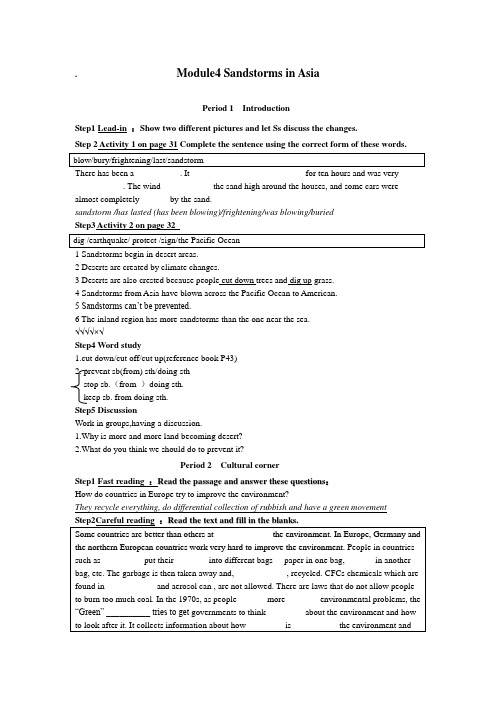
. Module4 Sandstorms in AsiaPeriod 1 IntroductionStep1 Lead-in :Show two different pictures and let Ss discuss the changes.Step 2 Activity 1 on page 31 Complete the sentence using the correct form of these words.___________. The wind ___________ the sand high around the houses, and some cars were almost completely ______ by the sand.sandstorm /has lasted (has been blowing)/frightening/was blowing/buriedStep3 Activity 2 on page 321 Sandstorms begin in desert areas.2 Deserts are created by climate changes.3 Deserts are also crested because people cut down trees and dig up grass.4 Sandstorms from Asia have blown across the Pacific Ocean to American.5 Sandstorms can’t be prevented.6 The inland region has more sandstorms than the one near the sea.√√√√×√Step4 Word study1.cut down/cut off/cut up(reference book P43)2. prevent sb(from) sth/doing sthstop sb.(from )doing sth.keep sb. from doing sth.Step5 DiscussionWork in groups,having a discussion.1.Why is more and more land becoming desert?2.What do you think we should do to prevent it?Period 2 Cultural cornerStep1 Fast reading :R e a d t h e p a s s a g e a n d a n s w e r t h e s e q u e s t i o n s:How do countries in Europe try to improve the environment?They recycle everything, do differential collection of rubbish and have a green movementStep3 Language points.1)The garbage is then taken away and, if possible, recycled.(P39 L10P1) (情景导学P52)2). These are laws that are not allow people to burn too much coal.(P39 L14P1)allow vt. 允许allow + n. /pron. 允许……allow + doing sth. 允许干某事allow sb. to do sth. 允许某人干某事allow sb. + prep./adv. 允许The manager has ______ to improve the working conditions in the company.A. acceptedB. allowedC. permittedD. agreed经理已经同意了改善公司里的工作条件。
外研版九年级上册Module 4导学案
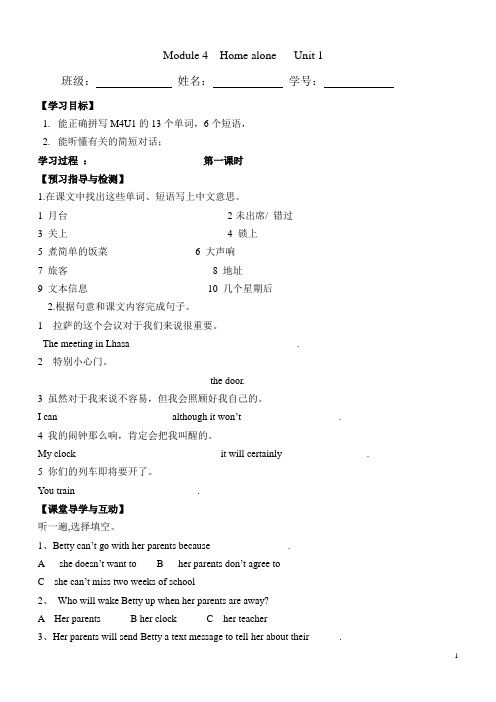
Module 4 Home alone Unit 1 班级:姓名:学号:【学习目标】1.能正确拼写M4U1的13个单词,6个短语,2.能听懂有关的简短对话;学习过程:第一课时【预习指导与检测】1.在课文中找出这些单词、短语写上中文意思。
1 月台______________________ 2未出席/ 错过__________________ 3 关上______________________ 4 锁上________________________ 5 煮简单的饭菜_________________ 6 大声响_____________________7 旅客________________________ 8 地址_____________________9 文本信息__________________ 10 几个星期后_____________________ 2.根据句意和课文内容完成句子。
1 拉萨的这个会议对于我们来说很重要。
The meeting in Lhasa _________________________________.2 特别小心门。
__________________________________ the door.3 虽然对于我来说不容易,但我会照顾好我自己的。
I can ______________________ although it won’t ___________________.4 我的闹钟那么响,肯定会把我叫醒的。
My clock ____________________________ it will certainly_________________.5 你们的列车即将要开了。
You train ________________________.【课堂导学与互动】听一遍,选择填空。
1、Betty can’t go with her parents because _______________.A she doesn’t want toB her parents don’t agree toC she can’t miss two weeks of school2、Who will wake Betty up when her parents are away?A Her parentsB her clockC her teacher3、Her parents will send Betty a text message to tell her about their______.A telephone numberB travel planC address【课堂反馈小测】(2分/题)1 我也是。
Module4导学案
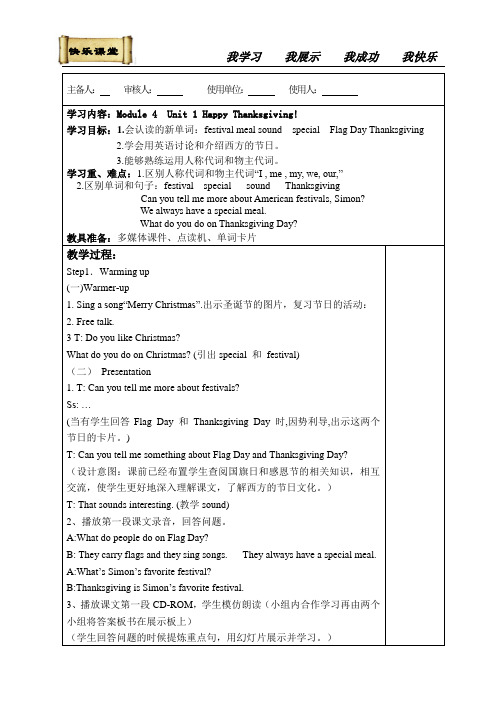
Homework: please think it over “What’s your family’s favorite festival?” and “What do you do on this festival?”.Please write an email and send it toyour friene festival.
A:What do you do on … festival?
B: …
(四)Summary.
T: Today we have learnt about festivals. And we know there is much difference between western festivals and Chinese festivals.
What do you do on Christmas? (引出special和festival)
(二)Presentation
1.T: Can you tell me more about festivals?
Ss: …
(当有学生回答Flag Day和Thanksgiving Day时,因势利导,出示这两个节日的卡片。)
What do you do on Thanksgiving Day?
教具准备:多媒体课件、点读机、单词卡片
教学过程:
Step1.Warming up
(一)Warmer-up
1.Sing asong“Merry Christmas”.出示圣诞节的图片,复习节日的活动:
2. Free talk.
3 T: Do you like Christmas?
B:Thanksgiving is Simon’s favorite festival.
Module 4.导学案

Module 4 知识点1.study at home 在家学习2.by email 通过电子邮件的方式on the computer on TV on the radio3. I’m not sure. 我不确信。
be sure to do sth. 确定\信做某事4. We will use the sun to heat our homes. = We will heat our homes with the sun. do sth. with sth. = use sth to do sth. 用……来做某事chalk 不可数名词 a piece of chalk 一支粉笔5. flying will be very cheap.(flying动名词,作主语)Heating homes will be cheap. = It will be cheap to heat homes.Playing basketball is my favourite sport.6. get warm 变暖do the dull jobs 做枯燥的工作7.:主语+ will +动词原形。
表将要发生的事情,will 没有人称和数的变化,后必须接动词的原形。
They will play football. It will be cool in summer.There be句型的将来时:There will be+名词+其他 .There will be rain tomorrow.\There will be a new school over there.8. long holidays 长假do heavy work 干重活9. three days a week 一周三天once a day 每天一次twice a week 每周两次four times a month每月四次10. free time空闲时间be free to do sth 有空做某事11. My dream will have big classrooms.= There will be big classrooms in my dream school.will 可以用be going to 代替,但be动词要根据单复数来变化。
Module4导学案
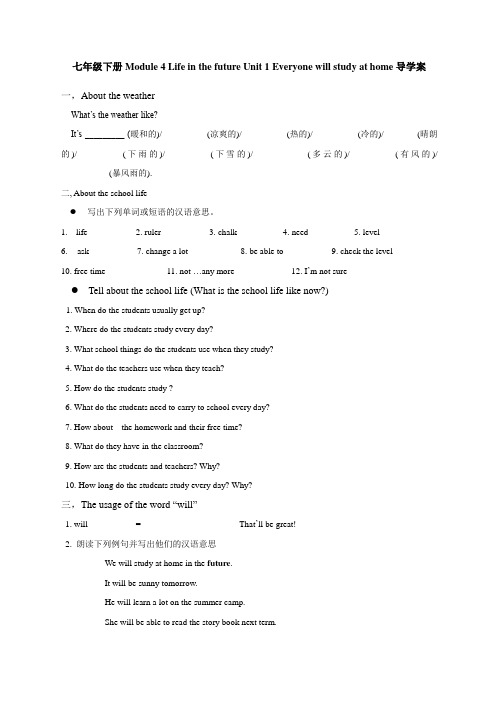
七年级下册Module 4 Life in the future Unit 1 Everyone will study at home导学案一,About the weatherWhat’s the weather like?It’s _________ (暖和的)/ _________ (凉爽的)/ _________ (热的)/ _________ (冷的)/ _______(晴朗的)/ _________(下雨的)/ _________(下雪的)/ ___________(多云的)/ _________(有风的)/ ___________(暴风雨的).二, About the school life●写出下列单词或短语的汉语意思。
1.life __________2. ruler __________3. chalk__________4. need__________5. level __________6.ask __________7. change a lot ___________8. be able to __________9. check the level _______10. free time _____________ 11. not …any more_____________12. I’m not sure _____________●Tell about the school life (What is the school life like now?)1. When do the students usually get up? ____________________________________________________2. Where do the students study every day? __________________________________________________3. What school things do the students use when they study? ____________________________________4. What do the teachers use when they teach? ________________________________________________5. How do the students study ? ___________________________________________________________6. What do the students need to carry to school every day?______________________________________7. How about the homework and their free time? __________________________________________8. What do they have in the classroom? _____________________________________________________9. How are the students and teachers? Why? _________________________________________________10. How long do the students study every day? Why? _________________________________________ 三,The usage of the word “will”1. will __________ = _____________ That’ll be great!________________2. 朗读下列例句并写出他们的汉语意思We will study at home in the future.It will be sunny tomorrow.He will learn a lot on the summer camp.She will be able to read the story book next term.There will be many cars in ten years’ time.你能总结出will的用法吗?它之后的动词应该是什么形式呢?它后面所接的时间如何?_______________________________________________________________ 巩固练习: I will __________(help) you take care of your children when you are not free.Jenny will __________(come) with Tim soon.Will they ___________(carry) lots of food for the picnic?What will she ____________(need) to have a party?There will ____________(not be) any trees in the park in ten years.3.把下列句子变成否定形式。
2022年外研版九上《Module 4 Home alone 导学案 (附答案)
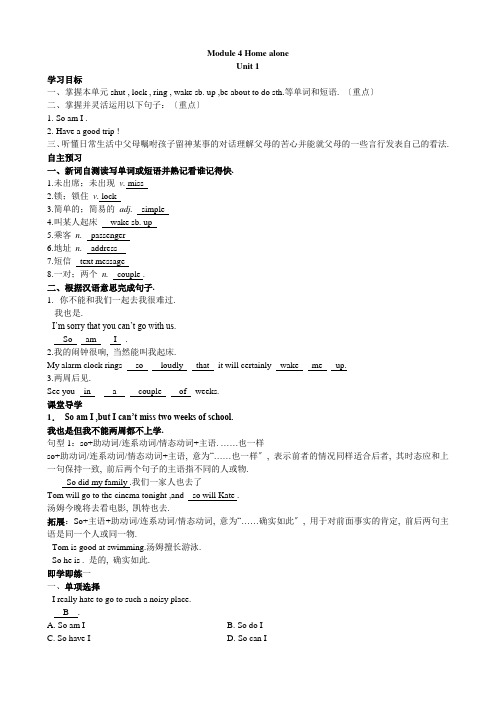
Module 4 Home aloneUnit 1学习目标一、掌握本单元shut , lock , ring , wake sb. up ,be about to do sth.等单词和短语. 〔重点〕二、掌握并灵活运用以下句子:〔重点〕1. So am I .2. Have a good trip !三、听懂日常生活中父母嘱咐孩子留神某事的对话理解父母的苦心并能就父母的一些言行发表自己的看法. 自主预习一、新词自测读写单词或短语并熟记看谁记得快.1.未出席;未出现v. miss2.锁;锁住v. lock3.简单的;简易的adj. simple4.叫某人起床wake sb. up5.乘客n. passenger6.地址n. address7.短信text message8.一对;两个n. couple .二、根据汉语意思完成句子.1.--你不能和我们一起去我很难过.- 我也是.- I’m sorry that you can’t go with us.- So am I .2.我的闹钟很响, 当然能叫我起床.My alarm clock rings so loudly that it will certainly wake me up.3.两周后见.See you in a couple of weeks.课堂导学1.So am I ,but I can’t miss two weeks of school.我也是但我不能两周都不上学.句型1:so+助动词/连系动词/情态动词+主语. ……也一样so+助动词/连系动词/情态动词+主语, 意为“……也一样〞, 表示前者的情况同样适合后者, 其时态应和上一句保持一致, 前后两个句子的主语指不同的人或物.-So did my family .我们一家人也去了Tom will go to the cinema tonight ,and so will Kate .汤姆今晚将去看电影, 凯特也去.拓展:So+主语+助动词/连系动词/情态动词, 意为“……确实如此〞, 用于对前面事实的肯定, 前后两句主语是同一个人或同一物.- Tom is good at swimming.汤姆擅长游泳.- So he is . 是的, 确实如此.即学即练一一、单项选择- I really hate to go to such a noisy place.- B .A. So am IB. So do I解析:在肯定句中, 当表示前者的情况同样适合后者时, 用“so+助动词/连系动词/情态动词+主语〞结构, 意为“……也一样〞. 上句中含有行为动词, 故答语中应该用助动词do. 应选B.2.T here won’t be anybody to wake you up in the morning.早上没有人叫你起床了.短语1:wake sb. up 把某人叫醒, 叫某人起床wake sb. up, 意为“把某人叫醒, 叫某人起床〞, 如果sb.是人称代词, 就必须放在两个词中间, 且要用宾格形式;如果sb.是名词, 那么既可放在两词之间, 也可放在up之后.The alarm clock wakes me up at 6:30 every morning.闹钟每天早上六点半把我叫醒Don’t wake up the children .= Don’t wake the children up .不要把孩子们叫醒即学即练二根据汉语意思完成句子明天早晨你能把我叫醒吗.Can you wake me up tomorrow morning?3. Your train is about to leave.你们的火车马上要开了.短语2:be about to do sth. 即将/正要做某事be about to do sth., 意为“即将/正要做某事〞, 表示将要发生的事, 在时间上指最近的将来.I was about to leave when the telephone rang.我正要离开, 这时响了.The new school year is about to begin.新学年即将开始即学即练三单项选择-Do you know when he came back?-Yes . At about twelve . I was just about A to bed.A. to goB. goC. goingD. went解析:考查be about to do sth.这个固定短语的用法, 意为“即将做某事〞. 应选A.Unit 2学习目标一、掌握本单元actually, order, unable, turn off ,be worried about ,tidy up等单词和短语. 〔重点〕二、看懂教材中的文章想想当父母不在身边时自己能做什么及不能做什么然后写一篇短文表达自己的观点. 自主预习根据句意及汉语提示完成单词.1. The book says he died at the age of 47, but actually (事实上), he died at 43.2. Usually Kate has only a snack (零食) at lunchtime.3. Don’t worry, son. You are unable (不会的) to do such a difficult job now.4. The old man has an empty (空的) purse.课堂导学1.Turn off the TV! 把电视关掉.短语1:turn off 关掉;关闭〔设备〕turn off, 意为“关掉;关闭〔设备〕〞, 其反义词组为turn on(翻开). turn off是“动词+副词〞结构, 如果后接代词作宾语, 代词要放在短语中间. 如果后接名词作宾语, 名词可放在短语中间, 也可放在off后.I want to sleep for a few more minutes . Please turn off the alarm clock.我想再睡几分钟. 请把闹钟关了.The TV is on. Don’t forget to turn it off before you go out .电视开着. 外出前别忘了要关掉.拓展:turn down与turn up的用法(1) turn down, 意为“关小, 调低〔音量〕〞.Its so noisy . Turn down the radio.这么吵把收音机音量调小点儿.(2) turn up, 意为“开大, 调高〔音量〕〞. 和turn down是一对反义短语.Turn the radio up so that the students can hear clearly.请将收音机音量调大点儿以便学生能听清楚即学即练一单项选择Will you please C the TV? I want to see the Animal World.A. turn offB. turn downC. turn onD. turn up解析:句意为“请你翻开电视好吗?我想看《动物世界》〞turn off, 意为“关闭〞, turn down意为“调小, 放低〞, turn on意为“翻开〞, turn up 意为“调高, 放大〞. 所以选C.2. I had to hurry to school without breakfast , but I was still late.我不得不没吃早餐就匆匆忙忙去学校但我仍然迟到.短语2:hurry to +地点匆匆忙忙去某地hurry作动词, 意为“匆忙, 急忙〞. “hurry to+地点〞表示“匆匆忙忙去某地〞, hurry to do sth. 意为“赶紧/匆忙做某事〞.The boy hurried to school.这个男孩匆忙赶到学校.When I saw the thief stealing the wallet from a man , I hurried to call to the police.当我看到那个小偷正在偷一个人的钱包时, 我急忙报了警.拓展:hurry up, 意为“赶快, 快点〞, 通常用于口语.Hurry up, or we’ll be late again.快点否那么我们又要迟到了.即学即练二如果你再不快点我们就赶不上火车了.We’ll miss the train if you don’t hurry up .3. The teacher asked me for my homework, but I could not hand it in.老师向我要家庭作业但我没能交作业.短语3:hand in 提交;上交hand in是动副短语, 意为“提交, 上交〞, 如果后接代词作宾语, 代词应放在短语的中间;如果后接名词作宾语, 名词可放在短语中间, 也可放在in后.Please hand in your homework / hand your homework in before school is over.放学之前请把你们的作业交上来Every student has to hand it in after visiting.参观之后每个学生都必须把它交上来即学即练三一、单项选择- Please A the paper , Jimmy !- But I haven’t checked it yet , Mr Black.A. hand inB. take outC. look atD. go through解析:hand in , 意为“上交〞, take out 意为“取出, 切除〞. Look at 意为“看〞, go through意为“经历〞句意为“请交试卷吧, 吉米! 〞“但是我还没检查呢, 布莱克先生〞. 应选A.二、根据汉语意思完成句子交卷前你应仔细检查你的答案.You should check your answers carefully before you hand in your paper.4. With an empty stomach, I was unable to play basketball with my classmates!由于饿着肚子, 我没法和我的同学们一起打篮球.单词1:unable 不会的,不能的unable为形容词, 意为“不会的, 不能的〞, 是able的反义词, be unable to do sth.意为“不能做某事〞, 相当于can’t do sth.. be able to do sth.意为“能够做某事〞.I am unable to swim though my father swims very well.尽管我父亲游泳很好, 我不会游泳.Jack was able to remember many things when he was very young.当杰克很小的时候他就能记住很多的东西.即学即练四单项选择He was seriously injured . He lay on the ground , C to stand up.A. was unableB. being not ableC. unableD. being able not解析:第二句中前后两个局部之间没有连词, 说明后面不是完整的句子. 故排除A项, unable意为“不会的, 不能的〞. 句意为“他受了重伤. 躺在地上, 不能站起来〞. 应选C.5.When my parents came home, they were happy to find that I could cook and tidy up now.我父母回到家的时候, 他们很快乐地发现我现在会煮饭和收拾房间了.短语4:tidy up 收拾;整理tidy up是由“动词+副词〞构成的短语, 意为“收拾, 整理〞, 其后可接名词或代词作宾语. 后接名词作宾语时, 名词既可以置于up前, 也可置于up后接代词作宾语时, 代词只可位于up前.The desk I s so dirty . I must just tidy it up a bit .这张桌子太脏了. 我必须得稍微收拾一下.即学即练五我经常帮助我妈妈收拾房间.I often help my mum to tidy up the room.Unit 3学习目标掌握运用so …that..引导的结果状语从句和although / though引导的让步状语从句. 〔重点〕The work was so difficult that he couldn’t finish it on time.I can look after myself , although it won’t be easy for me.自主预习根据汉语意思完成句子.1.老亨利是如此孤独, 以至于他每天都想知道一些特别的事.Old Henry is so lonely that he hopes to know about something special every day.2.即使天气不好, 我们也要进行一次旅行.We’ll make a trip even if / though the weather is bad.课堂导学1.They are all in a hurry to get to the airport , so they forget Kevin and he is left alone at home byaccident.他们全都匆匆忙忙去了机场, 所以他们把凯文忘了把他意外地单独留在了家里.短语1:by accident 偶然地;意外地by accident为副词短语, 意为“偶然地;意外地〞, 在句中常用于动词后作状语, 其同义短语为by chance.I hurt my leg by accident last week.上个星期我不小心伤着腿了.I found my card by accident in the library.我意外地在图书馆里找到了我的卡片即学即练一根据汉语意思完成句子哥伦布偶然发现了美洲大陆.Columbus discovered America by accident /chance .2. But later on ,be goes out and hears two bad men called Harry and Mary planning to steal from his house. 但是后来他出去时听见两个叫哈里和马弗的坏人打算去他家偷东西.单词1:hear 听见;听到hear 作动词, 意为“听见;听到〞, 强调听的结果. 其常用结构:hear sb. doing sth. 听见某人正在做某事hear sb. do sth. 听见某人做某事I hear someone knocking at the door.我听到有人在敲门I hear Lucy cry in her room last night.昨晚我听到露西在她的房间里哭泣.即学即练二单项选择I often hear Linda D this song. I heard her it when you phoned me a moment ago.A. singing ; singingB. singing ; singC. sing ; singD. sing ; singing解析:由often可知第一空填加动词原形, 表示经常性的动作, 排除A、B两项;由when引导的时间状语从句可知, 第二句强调动作正在进行, 所以用现在分词. 应选D.语法规律总结结果状语从句和让步状语从句一、结果状语从句1. so…that…意为“如此……以至于……〞, so后接形容词或副词的原级, 表示程度, that引导的是结果状语从句.The book is so expensive that I can’t afford it .这本书如此贵, 以至于我买不起This story was so convincing that hundreds of people believed it .它这个故事如此令人信服, 以至于成百上千的人相信了它.2.在so…that…句型中, 当that引导的结果状语从句是一个肯定句时, 可以与enough to …互换;当that引导的结果状语从句是一个否认句时, 可以与too…to..互换.Miss Gao asked a question, it was so easy that everybody could answer it .= Miss Gao asked a question ,it was easy enough for everybody to answer.高老师问了个问题. 这个问题太简单了, 以至于大家都会答复.这架相机太贵了, 我买不起.二、让步状语从句1. although/though 作连词, 意为“虽然〞, 引导让步状语从句.Although / Though it is snowing , it is not very cold .虽然正下着雪, 可并不太冷.2. although/though引导让步状语从句时, 不能与but同时使用,但可以与yet ,still连用.Though my uncle doesn’t have much money ,(yet )he is very happy.虽然我叔叔没有很多钱, 但是他很开心.He is very busy , but he is very happy .虽然他很忙, 但是他很开心.即学即练单项选择1. Teresa is C nervous she can’t talk in front of the class.A. such ; thatB. too ; toC. so ; thatD. / ; but解析:such…that 和so…. that …都可引导结果状语从句, such后接名词, so后接形容词或副词. 在too…to…结构中, too后接形容词或副词, to后接动词原形. 根据句意“特雷莎是始此紧张以至于她不敢在同学面前说话. 〞可知选C.2. A the girl is young , she can make money herself.A. AlthoughB. SinceC. EvenD. If解析:句意为:“这个女孩虽然年轻,但是她能自己赚钱. 〞although作连词, 意为“虽然〞. 应选A. Unit 1学习目标一、掌握本单元including, attend, whatever, give up等单词和短语. 〔重点〕二、掌握并灵活运用以下句子:〔重点〕1. Whatever she does , she never give up !2. That’s amazing.三、听懂有关英雄人物的对话并能流利地介绍自己喜欢的名人.自主预习新词自测读写单词或短语并熟记看谁记得快.1.包含;包括prep.2.出席;参加v.3.在国外;到国外adv.7.意志;决心n. 8.获胜;胜利n.9.实在;确实adv. 10.惊人的adj.课堂导学1. Whatever she does , she never give up .无论她做什么, 她从来都不放弃.单词1:Whatever 无论什么;不管怎么样Whatever作连词, 意为“无论什么;不管怎么样〞, 在本句中引导状语从句. whatever相当于no matter what, 还可以引导主语从句, 也可引导宾语从句.happens , stay calm.不管发生什么情况, 保持镇静.归纳:类似whatever的词还有:wherever无论在哪里, however然而, whoever无论, whenever谁无论何时等. You can go wherever you like.你可以去你喜欢的任何地方Whoever comes will be welcome.不管谁来都欢迎短语1:give up放弃give up, 意为“放弃〞, 后接名词、代词或动名词作宾语. give up为动副结构的短语, 当宾语为代词时, 代词要放在短语中间.Tom isn’t good at math , but he won’t汤姆不善长数学, 但他不会放弃数学的To keep healthy , you should smoking要想保持健康, 你应该戒烟即学即练一一、单项选择- Why did your uncle finally such a good chance to work abroad?- Because he wanted to do more for our country.A. look upB. make upC. give upD. use up二、按要求完成句子改为同义句.Whatever he says , she will agree with him (改为同义句)he says , she will agree with him.2. Well, I think she’s a good student as well as a good player.嗯, 我认为她不仅是一名优秀的运发动, 而且还是一名好学生.短语2:as well as 也;不仅……而且……as well as, 意为“也;不仅……而且……〞, 常用来连接两个并列的成分, 强调as well as前面的内容. as well as连接两个名词、代词等作主语时, 谓语动词跟as well as前面的词在人称和数上保持一致.Bob can speak Spanish English.鲍勃不仅会讲英语, 也会说西班牙语.提示:as well as和not only…but also…同义, 但前者的语意重点和后者的语意重点恰好相反.Jennifer can sing as well as dance. 〔强调唱歌〕珍妮弗不但会跳舞, 也会唱歌.Jennifer can not only sing but also dance.〔强调跳舞〕珍妮弗不但会唱歌, 也会跳舞.即学即练二一、单项选择The mother, as well as her two daughters, to the theatre with some friends this evening.A.are goingB.were goingC.is goingD.was goingUnit 2学习目标一、掌握本单元sick, treat, manage, die for , take care of , on one’s own等单词和短语. 〔重点〕二、看懂介绍白求恩的文章并能就自己所学所知写一篇类似的短文.自主预习一、新词自测读写单词或短语并熟记, 看谁记得快.1.加拿大的;加拿大人的adj.2.士兵n.3.伤;伤口n.4.为……而死5.了解;意识到v.6. 垂死的;即将死亡的adj.7. 那时候8. 创造;创造n.9. 做成;〔尤指〕设法完成v.10. 〔使〕继续v.二、用所给词的适当形式填空1. Dr Bethune is one of the most famous (hero) in China.2. He often worked very hard without (rest) or (take) care of himself.3. Once , he managed (save) over a hundred lives.课堂导学1.Dr Bethune developed new ways of taking care of the sick.白求恩大夫开发了新方法来照顾病人.短语1:take care of照顾;护理take care of, 意为“照顾;护理〞其中care为不可数名词, 前面不用冠词修饰. 此短语后面可接名词或代词作宾语, 其同义短语为look after.She stayed at home and her mother yesterday.昨天她待在家里照顾她母亲.短语2:the+形容词某一类人或事物句中the sick, 意为“病人〞. 定冠词the与形容词连用, 表示复数意义的“某一类人或事物〞. 当这种结构作主语时, 谓语动词用复数形式.need us to care about them.盲人需要我们关心他们即学即练一一、单项选择young will like this kind of sport , but old will not.A. A;aB. A;theB.The ; aC. The ; the二、根据汉语意思完成句子当我不在家时, 照顾好你自己.When I’m out , yourself.2. At that time, there were few doctors , so he had to work very hard on his own.那时候, 那儿几乎没有医生, 所以他得努力地单独一人工作.短语3:at that time那时候at that time是固定词组, 意为“那时候〞, 常用于过去时或过去进行时的句子中.He was sleeping . 他那时正在睡觉短语4:on one’s own单独一人on one’s own, 意为“单独一人〞, 还可表示“靠自己;独立地〞, 一般用作状语, 相当于by oneself或者alone. Although her father is in the company , Mary got the job 尽管她父亲在这个公司里, 但玛丽是靠自己得到那份工作的.We should do our own things 我们自己的事情应该自己做.即学即练二一、单项选择- What were you doing when I called at 8 p.m. yesterday?- I the piano at that time.A. playB. is playingC. playedD. was playing二、根据汉语意思完成句子学生们应该独立完成他们的家庭作业.Students should finish their homework .3… and managed to save over a hundred lives.……设法挽救了一百多条生命.单词1:manage .做成;〔尤指〕设法完成manage作动词, 意为“做成:〔尤指〕设法完成〞, 其后可接名词、代词或动词不定式, manage to do sth.意为“设法做成某事〞. manage作动词, 还可表示“管理, 经营, 控制〞等后接名词或代词.We the work ahead of time.我们设法提前完成了工作She the shop while the owner was away.店主不在的时候她照管商店即学即练三根据汉语意思完成句子最后警察设法抓住了那个小偷.At last , the policeman the thief.4. In the end , he died of his wound.最后, 他因他的伤口〔感染〕而死.短语5:die of 因……而死, 死于……die of, 意为“因……而死. 死于……〞, 原因常来自内部, 后常接hunger, illness , cancer ,sorrow等名词. Steve jobs illness on October 5, 2021 .史蒂夫乔布斯于2021年10月5日因病逝世.Every year , nearly one million people hunger.每年约有一百万人死于饥饿.拓展:die from的用法die from, 意为“死于……〞原因常来自外部, 由环境造成〔主要指事故等方面的外部原因〕, 后常接accident , overwork , drinking , smoking等名词.即学即练四一、单项选择My grandma died cancer.Unit 3学习目标掌握原因状语从句目的状语从句和结果状语从句的用法. 〔重点〕Many people were dying because they did not get to hospital quickly enough.There were few doctors ,so he had to work very hard on his own.He wrote books so that they could about how he treated the sick.自主预习从方框中选择适当的连词完成句子1. I didn’t know which dictionary was better , I took neither.2. Traffic is heavy and the price of oil is much higher, many people go to work by bus instead.3. Both of his parents work in the city . he lives with his grandparents in the village.4. The teacher speaks loudly the students can hear her clearly.5. If you go to visit London , don’t forget your umbrella it rains a lot there .课堂导学On 12th April 1961, Gagarin took off for space .1961年4月12日,加加林乘宇宙飞船飞往太空.短语1:take off 〔飞机等〕起飞take off是动词短语, 意为“〔飞机等〕起飞〞, 反义词是land. 它还可表示“脱下;取下〞, 反义短语为put on. When will the plane ?飞机何时起飞He his raincoat and took out the key.他脱下雨衣, 拿出钥匙.注意:take off是由“动词+副词〞构成的短语, 当其后接代词时, 代词要放在take和off的中间. 当其后接名词时, 名词放在off的前后均可.Put on you r clothes . Don’t take them off.把你的衣服穿上. 别脱下来.即学即练一、单项选择Attention please . The plane will in five minutes.A. take outB. take afterC. take offD. take care二、根据汉语意思完成句子这个人脱下他的毛衣, 出去了.The man his sweater and went out .语法规律总结原因、结果和目的状语从句.1.原因状语从句〔1〕because引导的原因状语从句because作连词, 意为“因为〞, 表示必然的因果关系, 语气较强, 通常放在主句之后, 假设需强调那么放在主句之前, 常用来答复疑问词why提出的问题. because引导的原因状语从句有时可与because of短语换用. because和so在一个句子中不能同时使用.I went to see a doctor because I had a cold.我去看医生, 因为我感冒了.-Why are you anxious?-为什么你很着急-Because my bike is broken.-因为我的自行车坏了.(2) since引导的原因状语从句since, 意为“因为;由于;既然〞, 侧重主句, 从句表示显然的或的理由, 常放在句首.Since we are young , we shouldn’t be afraid of making mistakes.既然我们还年轻, 我们不该害怕犯错误.2.结果状语从句so常用来连接并列句, 前一分句表示原因, 后一分句表示结果. so和since不能连用.They worked very hard , so they could finish the work before supper.他们拼命地干活, 所以在晚饭前就能把工作做完.It is very cold outside ,so I wore a heavy coat.外边很冷, 所以我穿了一件厚大衣.3.目的状语从句so that 引导的目的状语从句中通常带有can , could , may , might ,should 等情态动词. so that引导的从句在主句后, 从句前不用逗号, 有时可省略that.I will tell you all the facts so that you can judge for yourself.我会告诉你所有的事实以便你可以自己判断.即学即练用so, so that , because , because of 填空1. This meal is my treat , put your money away.2. I get up early I can do some exercise.3. I didn’t eat the fish the smell was terrible.4. David didn’t go to school his illness.。
外研版九年级上册英语导学案Module 4

初三上册英语导学案Module 4 Great inventionsUnitⅠPaper and printing have been used for ages(课前预习)Ⅰ、预习目标:1. 初步理解对话大意。
2 .理解记忆新单词和短语。
3. 感知理解新语法:现在完成时和情态动词的被动语态。
Ⅱ、预习过程一、阅读对话,在文中划出下列词汇,并注出音标和词义。
1、advantage (n.) / /2、digital (adj.) / /3、battery (n.) / /4、charge (v.) / / ___________5、favour (n.) / / ____________6、publish (v.) / /__________7、ordinary (adj.) / / ________8、replace (v.) / /________二、阅读对话,在文中找出下列短语,朗读并默写。
1、能帮我个忙吗?2、拍些照片_________________3、在……参观之中4、网络杂志5、从现在开始 _______6、意味着做……7、从书本中获得信息8、被……所取代___________________ 9、几个月10、照看、负责(注意)11、没关系12、被借给某人13、把……留在 _________________ 14、给你15、与……相同三、快读P26对话,回答问题:1、Why does Tony want to borrow his father’s digital camera ?2、What’s the important advantage of the online magazine ?四、在对话中划出含有现在完成时、情态动词被动语态的句子,总结:现在完成时被动语态的构成:——————————————情态动词被动语态的构成:_______________________________五、再读对话,将下列句子与P27 activity 6 同义句匹配。
外研版九年级下册英语:Moudle4导学案
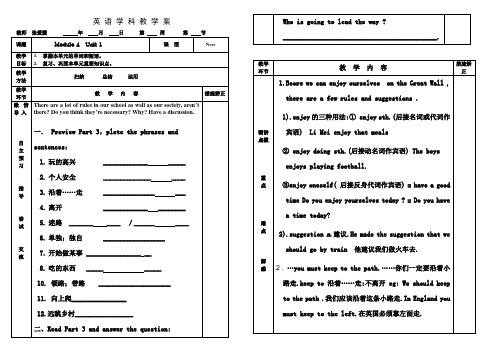
3.…every time there was a sudden noise ,my blood went cold .go变为,处于(不好的状态)后接形容词
Her face went red when she head that
4.The water runs down the hill and into a ________.
5.I’m very ________ about what you said.
二.完成句子.
1.注意听!我要告诉你事情的真相.
______ _______! I’ll tell you the truth.
3.Did you see a man _________ ( walk ) along the wall at eight yesterday morning?
4.The little girl is afraid ________ ( visit ) her grandparents all by herself .
教学
环节
教学内容
措施矫正
学案
交流
展示
任
务
、
讨
论
、
展
示
Step1: Lead in.
Step2: Listening.
Listen to Part 3 and try to answer the following questions.
Q1. Why mustn’t they walk along the edge?
___________________________________________
- 1、下载文档前请自行甄别文档内容的完整性,平台不提供额外的编辑、内容补充、找答案等附加服务。
- 2、"仅部分预览"的文档,不可在线预览部分如存在完整性等问题,可反馈申请退款(可完整预览的文档不适用该条件!)。
- 3、如文档侵犯您的权益,请联系客服反馈,我们会尽快为您处理(人工客服工作时间:9:00-18:30)。
Module 4 Sandstorms in Asia年级:高一第一课时Ⅰ.IntroductionLearning aims:1. Read and get the general idea and information of the introduction.2. Master some useful words and phrases.1. It lasted for ten hours and was very frightening. (P31)①last vi. 持续;维持。
注:last不用被动形式,其后接一段时间,介词for可有可无。
eg. Our summer holidays last(for)a long time every year.②frightening adj. 吓人的;可怕的;令人恐惧的。
a frightening experience 一次可怕的经历【拓展】frighten vt. 吓唬,使惊恐frightened adj. 害怕的fright n. 惊吓,恐怖frighten away/off 吓跑frighten sb. into / out of doing sth. 吓得某人做/不做某事frighten sb. to death 把某人吓得要死【巩固】I have experienced nothing more f________ than the accident.2.The wind blew the sand high around the houses,and some cars were almost completely buried by the sand.(P31)blow vt.& vi. 吹,吹动,刮。
【思维拓展】:blow away 刮走blow down 刮倒blow over 刮倒,吹倒blow off 吹掉blow out 吹灭blow [C] 打,打击,奇袭,猛攻。
例如:give sb. a blow on the head给某人头上一击3. Deserts are also created because people cut down trees and dig up grass.(P31)cut down 砍倒;缩减;杀死;降价。
eg. We can’t cut down our expenses any more.我们不能再削减费用了。
I managed to cut the shopkeeper down to $100 for the watch.我跟店主杀价,终于把这手表降到100美元。
【拓展】cut in 插嘴(后不带宾语)cut off 切断;阻隔cut up 切碎;剁碎cut away 切除;减去cut out 裁剪;住口;删除【巩固】I was just talking to Mark when Jack_________(用cut的短语填空)dig up掘出;挖出;发掘;捐出。
eg.Can you dig up any money?你能凑点钱吗?第二课时Ⅱ.Reading and vocabularyLearning aims:1. Read and get the general idea and information of the passage.2. Master some useful words and phrases.3. Understand the long and difficult sentences, and then use them freely.Part one Reading Comprehension1.Which of the following is true ?A.China is going to start a mass campaign to help solve the problem of sandstorm.B.The four main places in the world where there are sandstorm are Central Asia, North America, Central Africa andAustralia.C.West China is part of the sandstorm centre in Central Asia.D. A sand storm can’t be forecast.2.Which of the following is related to Ren Jiabo ?A.“To have been caught in a sandstorm was a terrible experience.”B.“To be cycling in a sandstorm is frightening.”C.“It’s difficult to breathe.”D.“You’d better not go out”3.When a sandstorm happens, people usually don’t see_______.A.an orange skyB.strong windsC.thick dustD.heavy rainPart two Language points1. Scientists have tried many ways to solve this problem and in China, a mass campaign has been started to help solve it.科学家们尝试了好多方法去解决这个问题,而且在中国,已经发动群众运动去解决这个问题了。
【句法分析】:Scientists have tried many ways 〔to solve this problem〕and in China, a mass campaign has been started to help solve it.(1)mass adj. 大量的;大规模的mass还可用作名词,意为“大量,大批”;还可用作动词,意为“集合,聚集”。
eg. They are facing the problem of mass unemployment.(adj.)他们正面临大量失业问题Masses of people attended the meeting.(n.)许多人出席了会议。
5,000 police were massed within two days.(v.)两天之内聚集了5000名警察。
【拓展】the mass = the public 群众,民众a mass of / masses of 许多,大量(2)campaign n. 战役,活动campaign还可用作动词,意为“发起运动,进行竞选”eg. This victory was the turning point of the whole campaign.(n.)这场胜利是整个战役的转折点。
She has been campaigning to make stronger anti-pollution laws.(v.)他为制定更强硬的反污染法一直在参加运动。
【拓展】carry on a campaign 发起一场运动a sales campaign 一场促销活动an educational campaign against smoking 一场反吸烟的教育活动【巩固】I have _______(许多)things to do.2. “To have been caught in a sandstorm was a terrible experience.” he said.他说:“碰上沙尘暴试一次很可怕的经历”。
【句法分析】:To have been caught in a sandstorm was a terrible experience.(1)句中动词不定式短语作______,表示具体的某一动作,此处不定式短语使用了完成式,表示“被围困在沙尘暴中”这一事件已发生。
eg. To have worked in the countryside helps him a lot.在乡下工作是他受益匪浅。
【注】:动词不定式短语作主语时谓语动词用单数。
(2)be caught in 突然遭遇(风暴等);被困住eg. She was caught in a traffic jam after work.下班后她遇到了交通堵塞。
【拓展】catch sb. doing sth. 当场撞见某人做某事be caught doing sth. 做某事被当场抓住catch up with sb. 赶上某人catch sight of 看见【注】be caught in 短语中的caught为过去分词,在此短语中并不强调被动,它已经形容词化。
类似的短语还有:be/get dressed in穿着。
衣服,be faced with面临、面对,be lost/absorbed/buried in专心于、专注于,be concerned with与。
有关,be involved in专心于、被卷入,be trapped/stuck in困在。
中、陷入。
中。
【巩固】____in the mountains for a week, the two students were finally saved by the local police .A.Having lostB. LostC. Being lostD. Losing4.Sandstorms begin in desert areas. Sandstorms in China appear to have increased in recent years as a result of“:desertification”.沙尘暴起始于沙漠地区,因“沙漠化”越发严重,中国近年来发生沙尘暴的次数明显增加了。
appear vi. 出现,好像,似乎eg. He appears quite old. 他显得很老。
She appears to have caught a cold. 他似乎是感冒了。
【易混词】appear:强调表面上给人的印象,但事实上不一定。
eg. She appears much younger than her age.seem:暗示有一定的依据,判断比较接近事实。
eg. He seems a nice man.look:强调视觉上给人的印象。
